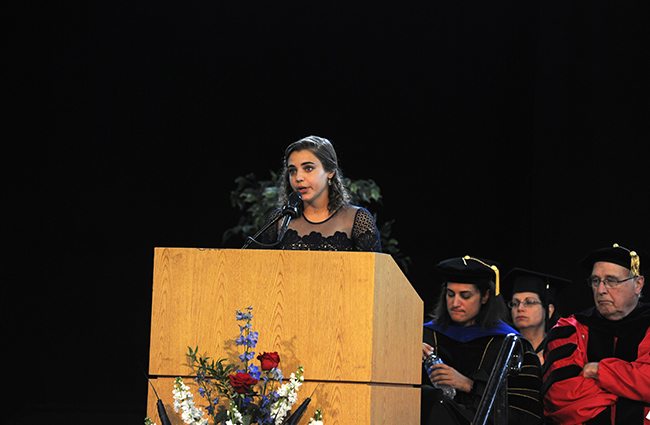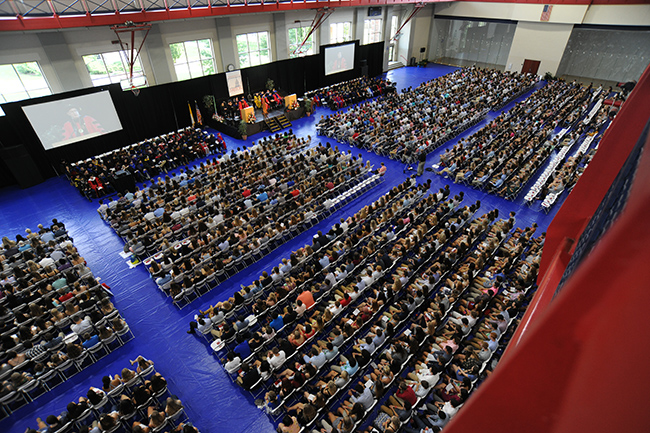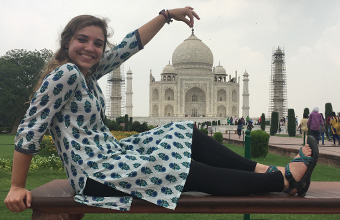College of Arts and Sciences Newsroom

A Fresh Perspective on the World
Meg Maloney, a senior environmental biology major from Glen Ellyn, Illinois, is blazing an admirable path at the University of Dayton. She is president of the Sustainability Club, a student leader in the Hanley Sustainability Institute and active with the Rivers Institute. On Tuesday, Aug. 22, she delivered the following student keynote address at convocation, which formally begins the academic year.
Welcome, Class of 2021, my name is Meg Maloney, and I am a senior environmental biology major with a minor in sustainability, energy and the environment. What an exciting place to be right now! Not only did you pick an amazing university to attend, but also you are at a pivotal point for the direction of your life! Coming into college, you have a blank slate. College is a beautiful time because you are now able to discover your passions, get involved in activities that matter to you and strive to try new things. Your time at the University is so much more than attending classes and graduating with a diploma in hand; it is about stepping out of your comfort zone, developing as a person, and looking at the world through a fresh perspective.
While the classroom has provided a firm foundation in my education at UD, experiential learning was something I didn’t anticipate. Experiential learning is a common phrase at the University of Dayton — this type of learning places an emphasis on hands-on opportunities, or giving students real-world experiences from which they can learn outside of the classroom. Not only does this help prepare you for your career, but it helps you test your limits. I challenge all of you to open your mind and heart to a new experience that will give you a fresh outlook on the world.
For me, experiential learning included two international experiences. Most recently, I traveled to China with the Rivers Institute to study the cultural, economic and ecological impacts of pollution on water. At the end of my sophomore year, I spent my summer in India learning about sustainable agriculture and development through the Honors Program and Hanley Sustainability Institute. Through my time traveling abroad, I learned an incredible amount about how the other side of the world lives. One of my most memorable experiences was living in a small rural, Himalayan village in Sikkim, India. This was my first time traveling out of the country, and most people thought I was insane when I told them I would be chilling in the Himalayas in a mud house for a month. During that summer, I lived with a host family and practiced sustainable agriculture. Each day, I would wake up at 5 a.m. and help do various chores such as milk the cow, plant corn and beans, and transplant rice. My host family did not have constant electricity, a stove or refrigerator, and only recently installed plumbing into their home. They did not go to the market to get any food and, instead, grew most of the food they consumed on their farm. I quickly fell in love with this lifestyle. I observed how they would prioritize their family and friends and spend most of their day in community. They took the time to teach me skills, and were incredibly patient and kind. Their lifestyle was the epitome of “working to live,” not “living to work.” It was an incredible experience to be a part of and truly altered the way I viewed my community and my future.
The most unforgettable lesson on the trip was learning how most of the world views food and water. Because my host family grew all of the food they consumed, they rarely let anything go to waste. We ate multiple times a day and fairly large portions, so sometimes it was difficult to finish all the food they gave me. When I didn’t finish, my host family watched in disappointment as I fed my leftover food to the goat. The goat was happy, but I felt awful letting their hard work go to waste.
One day, my host family gave me a bowl of dried rice to eat between lunch and dinner. I had a huge breakfast and lunch that day, so I could not physically finish my bowl of rice. I felt awful having to feed it to the goat, because I know how hard my host family worked to make the rice, so I decided I had to hide my bowl of rice so they wouldn’t know I couldn’t finish it. I poured my rice into a pocket of my skirt, and decided I would walk to the bathroom to pour out the small amount I had left into the toilet. I told my host mom I was just running out to the bathroom, and I would be back in five minutes. However, the toilet was not strong enough to flush the rice, so no matter how many times I flushed it, the rice stayed in the toilet. In a panic, I then poured the toilet rice water into the sink hoping to get rid of my trail. Little did I know, the sink had a grate in it. As much as I tried to grind the rice, I couldn’t wash it down the sink. I had now been in the bathroom for 15 minutes, and I didn’t want to concern my host family, so I went to Option C — I threw the entire toilet rice water out the window and then crawled out the window to bury the rice in the dirt … and guess what, no one ever found the rice again. It was truly one of the most desperate moments of the life.
Looking back on this moment, I learned a very important lesson. One, always tell the truth (you would think at a Marianist University I would have learned that sooner) and two, my host family would not be offended that I couldn’t finish the food, instead they were just disappointed because they put in a lot of work to get food on the table. For me, this opened my eyes to the way I look at food, but, more broadly, the sustainability of what we eat and how hard the world works to put food and water on our table. For me, this was a pivotal point in my life because it helped me realize and understand how most of the world lives. This experience as a whole altered my perception on how I look at my life in the United States, and also solidified my aspiration of continuing to travel abroad and work with rural villages to study and implement sustainable-related projects.
This year, I am currently applying for a Fulbright fellowship in Nepal to study how to protect water resources in a landscape that is deeply impacted by climate change. After that fellowship, I hope to continue my education with a master’s program in environmental education to inform others about how to protect our wildlife and live more sustainably.
Your next four years will go something like this — maybe not so much of the flushing rice down the toilet in a state of panic, but memorable experiences that teach you a lesson and give you a fresh perspective on the world. These experiences do not need to be halfway around the globe, but instead could be trying a new club or activity, engaging in community activism and development, or simply stepping outside of your comfort zone to challenge yourself on or off campus. There are close to 12,000 people on this campus, with 12,000 different experiences and views on the world. My challenge to you is try and understand the world through a different lens, and don’t be afraid to make a mistake along the way.
Three years ago, when I was sitting in the same seat as you right now listening to the student convocation speaker, I did not ever think that I would be where I am today. Honestly, I did not know where I would be, and I think that is the most exciting part. You have four years to create a new legacy for yourself. You have four years to pave a new path, develop as a person, and create a future that helps guide you to success. If you take anything away from today, my best advice for you is to embrace the unknown, grasp opportunities, and allow yourself to make and learn from mistakes and continue to pave your own way at the University of Dayton. And just remember, sometimes it takes moments of trying to desperately flush rice down the toilet to change your view on the world. Thank you.
- Meg Maloney, ’18



